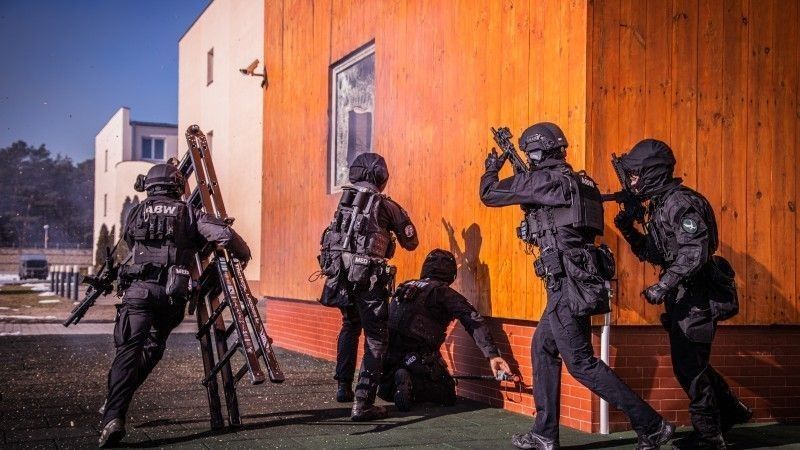Defence Policy
Russian Sabotage Operations Targeting Poland? “Russia views Poland as a country that de facto is involved in the war”

„The Russian intelligence is ready to conduct operations as such, especially targeting the critical infrastructure and the transportation network elements related to the delivery of support for Ukraine”, said Adam Jawor, former Polish counterintelligence officer, speaking to InfoSecurity24.pl. He added that „one should assume that as the military situation that Russia is facing deteriorates, a decision may be made to conduct an operation as such”.
Dominik Mikołajczyk: As confirmed by the Minister responsible for coordinating the Polish intelligence operations, Mariusz Kamiński, the counterintelligence managed to dismantle a Russian espionage network operating in Poland. Could there be more groups as such active in Poland now, than a few years back in your opinion?
Col. (ret) Adam Jawor, Counterintelligence: The Russians, preparing the operation in Ukraine, have intensified their intelligence activities in the so-called "close-abroad" area, Poland included. They were aware of the fact that their diplomats would be expelled, so they had to get ready for intelligence operations originating outside of the diplomatic cover. Thus, one should assume that networks as such do operate in Poland, being able not only to collect intelligence, but also to prepare sabotage operations, or operations diverting one's attention. In the case of the group that was arrested, one shall note that, as the official release suggested, it was established that money was being transferred as payment for the conducted activities, which may suggest that we were dealing with a kind of intelligence outsourcing, not intelligence officers per se.
Why did the Russians want to monitor the railway traffic continuously for instance?
The railway infrastructure remains one of the most sensitive elements of the critical infrastructure, belonging to the non-military state security system. More than 20% of goods in Poland are transported by trains. Currently, as the Russian-Ukrainian war is ongoing, and as Poland is granting support within that scope, along with the allies, to Ukraine, the railways are used to transport a large portion of that support. Analyzing the railway traffic in an ongoing manner, one can draw data and conclusions on the scale and type of supplies required by Ukraine to continue the war. Based on that data, one can plan any destructive actions aimed at the disruption of the supply chain. These may be tied to operations conducted both in Poland and Ukraine as well. Internally, we may be dealing with cyber-attacks targeting the railway control systems, and in extreme scenarios - kinetic attacks aimed at destroying the railway infrastructure.
The Subcarpathian (Podkarpacie) region, as well as the airport near Rzeszów, are strategic locations, from the point of view of distributing aid to Ukraine, not just humanitarian aid, but also military aid. How those locations should be made secure?
The routes used in the supply chains should be secured just as well, as the logistical hubs, to secure them from any action that may disrupt or interrupt the deliveries. The activities should also refer to the whole critical infrastructure in that area. The official releases suggest that several recording systems were installed close to the railway networks. That means that those locations, so far, have not been sufficiently protected, or monitored.
How the activities undertaken by the Russian intelligence in Poland may impact what happens in Ukraine?
Apart from gathering intelligence regarding the state defence system, internal and foreign policies, or confidential data, one shall expect disinformation operations, and operations leading towards polarization of views and cultural matters. The Russians will be inspiring any kind of action that would lead to the emergence of conflicts, between the Ukrainians, and the Poles. At the same time, creation operations would be launched, aimed at establishing pro-peace social movements for instance.
So, the threat caused by the potential sabotage and intelligence operations conducted by the Russian intelligence services is real, in your opinion?
The Russian intelligence is ready to conduct operations as such, especially targeting the critical infrastructure and the transportation network elements related to the delivery of support for Ukraine. One should assume that as the military situation that Russia is facing deteriorates, a decision may be made to conduct an operation as such.
The Russians do have a history of such operations conducted abroad, for instance destroying the Vrbetice ammunition storage facility in the Czech Republic, back in 2014, and arms storage facilities in Bulgaria, belonging to Emilio Gebrev, an arms dealer. The operations in question were executed by the GRU special unit 29155. Furthermore, one shall not forget that Russia views Poland as a country that de facto is involved in the war.
So, a Russian spy - who is he? Is that usually an embassy employee? A recruited foreigner? Polish citizen working for foreign intelligence?
Each person remaining in possession of information that could be used by the Russians may be an object of interest and activities. The nationality or association with a specific state does not matter here. The knowledge that may be obtained and transferred to intelligence services is the only thing that matters.
What behaviours should we be aware of, to help the intelligence services, and not flood them with ungrounded reports?
Any non-standard interest in the critical infrastructure, any interest in our professional responsibilities, and our network of connections among people who could have access to sensitive information or people who are in possession of specialist know-how and skills.
Thank you for this conversation.
Adam Jawor, Col. (ret), Counterintelligence, EUROPOL's Expert on Russian affairs. During his career, he was working as a leader of numerous organizational units, in the role of Director, Deputy Director, or expert.
